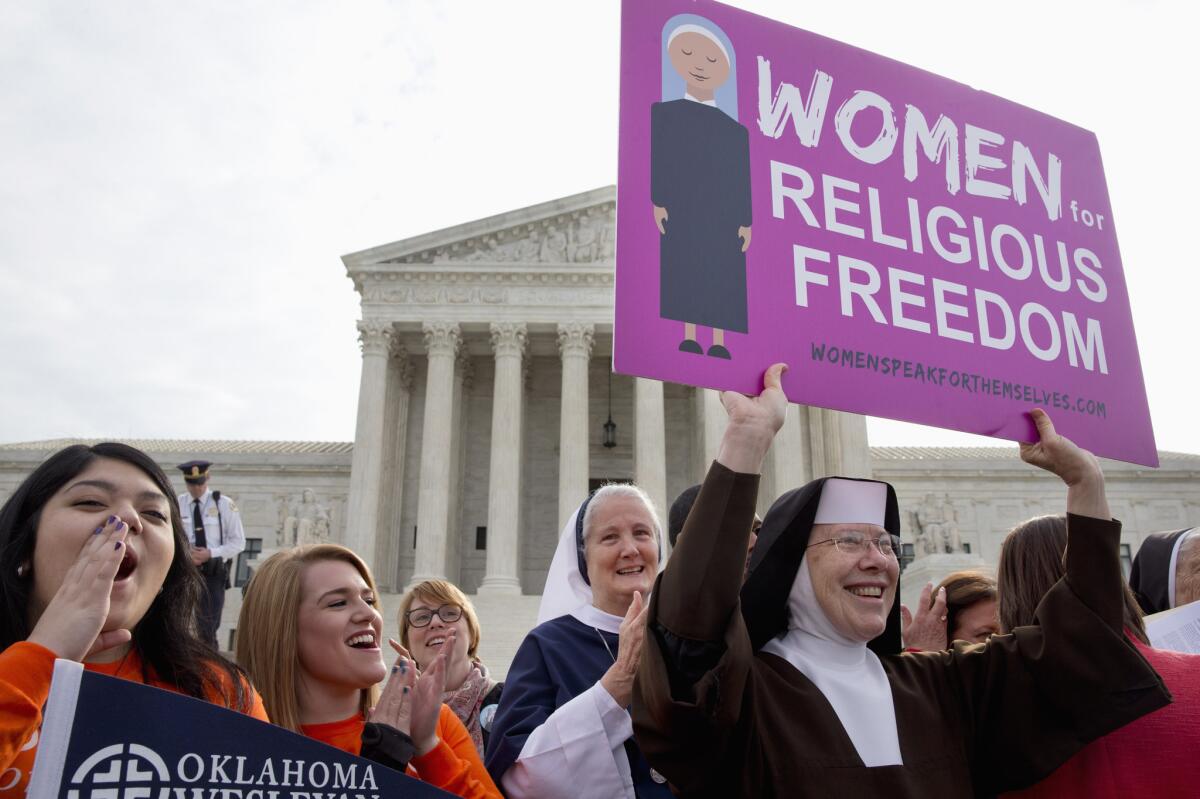In religious liberty vs. Obamacare contraceptives, Supreme Court appears deadlocked

Nuns and their supporters rally outside the Supreme Court.
- Share via
Reporting from Washington — The Supreme Court justices sounded evenly split Wednesday when asked to strike a balance between a Catholic nonprofit’s right to religious liberty and its female workers’ ability to obtain the free birth control promised under President Obama’s healthcare law.
Faced with a possible 4-4 deadlock due to the vacancy left by the death of Justice Antonin Scalia, the court may opt to delay a decision until a ninth justice can be confirmed, something that may not occur until next year.
Dozens of religious nonprofits, including evangelical colleges and charities such as the Little Sisters of the Poor, are suing the Obama administration over the so-called contraceptive mandate, adopted during implementation of the Affordable Care Act.
The administration is defending the mandate, warning that tens of thousands of women who work for religious nonprofits and charities could be left without the contraceptives or forced to pay for the cost themselves.
The case marks the fourth time the high court has heard a challenge over Obamacare, the president’s signature domestic achievement.
Twice before, the court’s liberal justices, joined by Chief Justice John G. Roberts Jr., rejected broad attacks intended to overturn or cripple the law.
In a third, narrower case in 2014, the majority said the Christian owners of the Hobby Lobby craft-store chain had a religious liberty right to refuse to pay for certain types of mandated contraceptives, which they believe cause early abortions.
The latest case centers around the same mandate and how it was applied to religious nonprofits and charities.
Unlike for-profit companies such as Hobby Lobby, religious nonprofits were allowed by the Obama administration to opt out of funding or offering contraceptive coverage to their workers, as long as they gave formal notice to the government of their religious objection. That notice would result in insurers offering the contraceptive coverage directly to the female workers.
But the Catholic bishops in Pittsburgh and Washington, joined by dozens of nonprofits, contended the accommodation still put a “substantial burden” on their religious freedom. They say even the notification makes them complicit in what they view as a sin.
Roberts said he agreed with the lawyer for the Little Sisters of the Poor who accused the administration of “hijacking” their health insurance plans for its aims.
Justice Anthony M. Kennedy appeared to agree. “The church plans are, in effect, subsidizing the conduct that they deemed immoral,” he told Solicitor Gen. Donald Verrilli.
That’s not correct, Obama’s lawyer replied. The insurers provide the contraceptives to the female employees, he said, but the “funds have to be segregated,” so none of church’s money is used.
Kennedy was not swayed. “If it’s so easy to provide, if it’s so free,” he said, “why can’t they just get it through another plan?”
The court’s liberals, led by its female justices, said the Obama administration had found a fair way to shield the employers from providing or paying for the contraceptives.
“As in all things, it can’t be all my way,” Justice Ruth Bader Ginsburg said. “There has to be an accommodation, and that’s what the government tried to do.”
Justice Elena Kagan said she could not understand how the Catholic charities could refuse to even notify the government they would not provide contraceptive coverage to their employees. You “object to objecting,” she said.
A conscientious objector to a war-time draft has to at least tell the government he has a religious objection to military service, added Justice Sonia Sotomayor.
In the Hobby Lobby case, Kennedy, often a swing vote, had written somewhat approvingly of the government’s “accommodation for nonprofit religious organizations.” He cited the opt-out as an example of what the government could have done for companies such as Hobby Lobby.
Based on that comment, the administration’s lawyers had hoped to win over some conservatives. But they had a rough outing Wednesday.
Nearly all the U.S. appeals courts have sided the with the administration and said the required notification did not amount to a substantial burden. One exception was the U.S. 8th Circuit Court of Appeals, based in St. Louis, which upheld a religious liberties claim.
The eight justices will meet behind closed doors to vote later this week. If they split 4 to 4, they cannot issue a decision. The tie vote will keep in place the lower-court rulings, even though it will mean different laws in different parts of the country.
It is possible the justices could devise a compromise of their own. At times on Wednesday, Kennedy hinted he could rule for the government on a different basis.
If the divide cannot be bridged, the court also could opt to hold the case over until a ninth justice and the case can be reargued in the next term.
Twitter: @DavidGSavage
More to Read
Sign up for Essential California
The most important California stories and recommendations in your inbox every morning.
You may occasionally receive promotional content from the Los Angeles Times.











